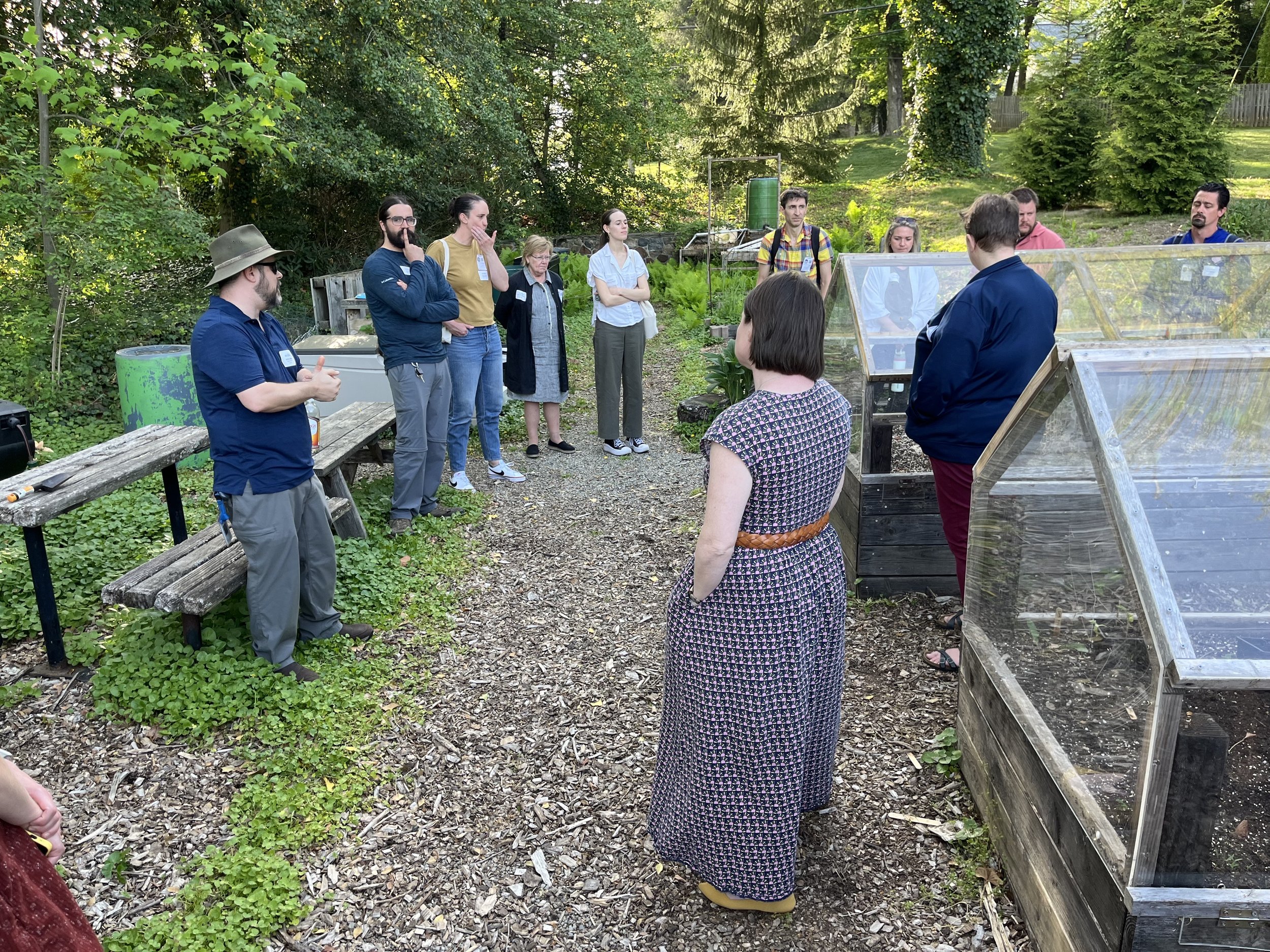On Wednesday April 30th, more than 30 educators, sustainability coordinators, and facilities staff from PAISBOA member schools came together for the group’s semiannual sustainability meeting, co-organized by PAISBOA and Boyer Sudduth Environmental Consultants (BSEC). This spring’s gathering was hosted by The Agnes Irwin School (AIS) and offered a space to share ideas, explore campus initiatives, and build connections around school sustainability.
The evening began with a round of introductions, giving each attendee the chance to share their name, school, and role. From seasoned facilities directors to new green team leaders, the range of experiences in the room highlighted that sustainability may vary across schools, but everyone was working toward similar goals.
James Miller, Middle School Science Teacher at AIS, leads a campus tour to highlight sustainability features and how they are integrated into classroom learning (Source: Boyer Sudduth Environmental Consultants)
Following the introductions, AIS science teacher James Miller led a guided tour of the campus, showcasing sustainability features and how they are integrated into classroom learning. The first stop was his own classroom, where students are growing plants under grow lights as part of a hands-on unit on seed germination and seasonal food systems. Miller explained that his middle school science curriculum ends with a culminating sustainability project, allowing students to synthesize what they’ve learned throughout the year in ecology, astronomy, and geology.
Post-COVID, Miller noted these sustainability efforts have also helped rebuild community among students and staff. “It became a way for us to come together again,” he said, referring to how collaborative environmental projects helped reconnect the school community.
The meeting’s attendees learn about the 8th-Grade gardens. What began as a student project is now a core part of the science curriculum at AIS. (Source: Boyer Sudduth Environmental Consultants)
The tour continued through one of AIS’s LEED-certified cafeterias, where Lower School students participate in composting competitions as a fun method to learn about food waste. Next, in the 8th grade gardens, attendees saw student-maintained beds with vegetables, herbs, and flowers. The garden began as a student-led project and continues to grow with new ideas, including the use of repurposed materials and the addition of a greenhouse-style roof to the raised beds. Students are currently working on a new bed constructed using the German “Hugelkultur” method, which uses decomposing wood and other organic material to naturally promote nutrient-rich soil.
Other stops included one of the school’s two green roofs and a broader look at AIS’s environmental design and initiatives. Attendees engaged actively throughout the tour, asking questions and sharing tips from their own schools’ experiences.
Gwenn Nolan, Founder of Mother Compost, provides information about school composting while participants eat a low-waste, plant-based dinner at AIS. (Source: Boyer Sudduth Environmental Consultants)
Following the tour, guests were treated to a root-to-stem, plant-based dinner, where the sustainability theme continued and concluded with a keynote presentation from Gwenn Nolan, founder of Mother Compost. Nolan shared the story behind the Philadelphia-area compost collection company’s founding and highlighted the urgent problem of food waste in our society, particularly among schools, institutions, and residential areas.
Since its founding, Mother Compost has diverted over 4.5 million pounds of food waste from landfills. The company now serves over 1,500 residential subscribers and has contracts with more than 30 schools, universities, and businesses. Nolan offered practical advice for schools looking to launch composting programs. She emphasized the importance of student, staff, and community buy-in, clear systems, and ongoing education.
The presentation closed with a Q&A session where attendees shared their own composting and food waste stories and challenges. Karen Tracy of Springside Chestnut Hill Academy offered information about a student-led program called SCH’s Shared Community Plate Chapter. Since its inception last year, SCH’s Community Plate chapter has delivered surplus cafeteria food to Whosoever Gospel Mission over 35 times, thanks to 22 dedicated student volunteers and support from kitchen director Budd Cohen. Together, they’re turning extra meals into meaningful impact. Tracy notes, “All schools likely have surplus to share and it doesn’t go into landfill.”
The PAISBOA Sustainability Meeting offered a valuable opportunity for peer learning, inspiration, and collaboration among schools committed to building greener futures. Whether it’s seeing a student-built garden in action or hearing firsthand how a composting company got its start, the event offered plenty of inspiration to carry back to schools across the region and bolster a growing network of sustainability-minded educators and professionals across the Philadelphia region.
Article by Sam Dickman, Sustainability Intern for Boyer Sudduth Environmental Consultants, Published in PAISBOA Friday Flyer Volume XV, No.7





